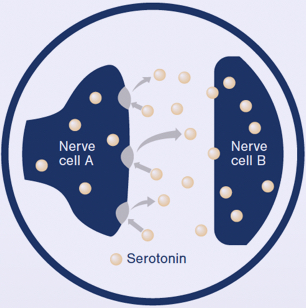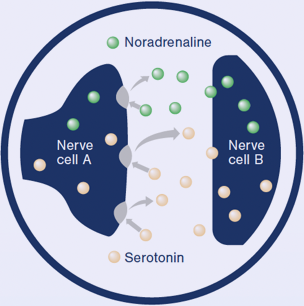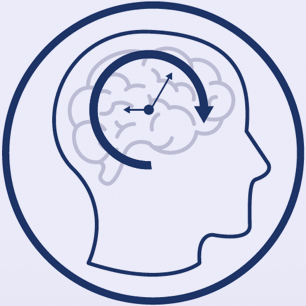WHAT IS ANXIETY?
It’s normal to experience anxiety from time to time. If those feelings don’t go away and become difficult to control, this may be due to an underlying anxiety condition.
Anxiety often feels like intense, excessive, and persistent worry. This can interfere with daily activities and engagement in everyday life.
Jump To Section:
3 million
Australians
live with anxiety
1 in 4
people experience anxiety
in their lifetime
Anxiety
is the most common mental
health condition in Australia.1

Comorbidity (having two or more conditions at the same time) between depressive and anxiety disorders is common.
Anxiety and depression can occur at the same time or precede each another in up to 90% of cases.2
To learn more about depression, head to our depression information page.
WHAT ARE THE SYMPTOMS?
The symptoms of anxiety can differ from person to person, but some common signs and symptoms of anxiety include:
- Feeling worried, anticipation of the worst
- Irritability
- Difficulty sleeping
- Feeling tense
- Difficulty concentrating & poor memory
- Gastrointestinal problems
- Muscular tension
- Sighing or rapid breathing.
Only a trained clinician (such as a GP, psychiatrist, or psychologist), can diagnose an anxiety disorder. If you are experiencing some of the symptoms above, you may decide to seek support to help you feel better.
Anxiety happens; it’s not a choice. It’s a feeling that overwhelms me.
Quotes and insights reflect the experiences of real people living with anxiety.
FIVE OF THE BIGGEST MYTHS
ABOUT ANXIETY:

“Anxiety is no big deal”
Not true
Anxiety symptoms can have a substantial impact on everyday life.

“All anxiety is the same”
Not true
There are several types of anxiety, and anxiety affects different people in different ways. Anxiety symptoms can vary from person to person.

“Anxiety and depression are not related”
Not true
It is common for people to have both. In up to 90% of cases, the conditions either occur at the same time or precede one another.

“It’s obvious when someone is anxious”
Not true
Although anxiety symptoms are extremely debilitating to those who suffer from it, symptoms can be vague and nonspecific and might not be noticeable to people around them. Some people also expend a lot of energy to appear ok on the outside.

“Anxiety cannot be treated”
Not true
Anxiety is highly treatable and there are several different options available for those requiring treatment. That is why it’s important to seek help and support when needed.
TYPES OF ANXIETY DISORDERS
There are several types of anxiety disorders, which are characterised by specific thoughts and behaviours. These include:
Generalised Anxiety Disorder (GAD):
- Months of excessive worry over everyday things
- Seeking reassurance about, or avoiding, situations where the outcome is uncertain
- Being overly concerned about things that could go wrong.
Social Anxiety Disorder (SAD):
- Fear and avoidance of situations where the person thinks they might be the center of attention
- Concern about doing or saying something embarrassing
- Concern others might notice the anxiety and judge you for it.
Panic Disorder:
- Sudden attacks of fear or anxiety (usually brief, but which may be so severe that the person thinks they might collapse or die)
- Concern of attacks recurring and avoidance of situations in which they might recur.3
Anxiety is a huge rock you always carry with you. It’s heavy, exhausting and makes whatever you’re doing so much harder. But you can learn to juggle it, and eventually leave it behind.
Patient Advocate – Katie*
TREATMENTS
Research has shown that lifestyle changes may be enough to avoid triggers and effectively manage anxiety for some people.
However, people who have anxiety can also benefit from a range of evidence-based treatments that are available.
Treatment can involve psychological interventions and/or medications.
Psychological interventions:
Psychological interventions are a form of treatment that aims to help individuals identify and manage their thoughts, feelings, and behaviours in a more effective way.
Cognitive behavioral therapy (CBT) is a psychological treatment that focuses on strategies to change thought patterns. It is the most thoroughly researched psychological treatment and has proven to benefit patients with anxiety.3
Other psychological therapies such as relaxation, interpersonal therapy and mindfulness can also be beneficial.3
Medications
Medication can be an important step to treating moderate to severe anxiety. Commonly prescribed medications include:
Antidepressants: medications prescribed to assist with the management of depression, and sometimes other conditions like anxiety. Certain antidepressants have been shown to be effective in treating anxiety, even if symptoms of depression aren’t present. They may be prescribed along with psychological therapy, when other treatments have not been successful, or in cases where symptoms are severe. Most antidepressants work by affecting three main chemicals in the brain – dopamine, noradrenaline, and serotonin. Some may also help to reset our circadian rhythms (internal body-clock).3
Common antidepressants classes include:

SSRIs
Selective Serotonin
Reuptake Inhibitors
These increase the amount of serotonin in the brain.

SNRIs
Serotonin and Noradrenaline Reuptake Inhibitors
These increase the amount of serotonin and noradrenaline in the brain.

Melatonergic
Antidepressant
Resets circadian rhythms (internal body-clock), which may be disrupted by depression and anxiety.4 Also increases the amount of dopamine and noradrenaline in the brain.
Benzodiazepines: a class with well-established evidence, often prescribed for anxiety and sleep issues. Although effective, there is a risk of side effects such as dependence and a potential for abuse.3
If medication is right for you, speak to your doctor about the benefits, risks, and potential side effects before commencing treatment.
Questions to Ask Your Doctor
Finding the right treatment for your depression involves asking your doctor the right questions. This will help you to better understand your symptoms and the different treatment options available.
It is important that your doctor understands what matters most to you, so together you can decide on which treatment is right for you.
The following questions will support you to start the conversation the next time you see your doctor. You can download the discussion guide:

STEP 1
Explain how you are feeling
You may then want to ask:
- Why do I feel like this?
- What caused these symptoms?
- What is my diagnosis?
STEP 2
Understand your treatment options
- Do I need treatment and if so, what are my treatment options?
- What are the risks and benefits of this treatment?
- How likely is this treatment to be successful?
- Do I need to see a specialist and if so, what kind and why? If your doctor recommends medication see step 2b
STEP 2B
Learn about the recommended medication
- What does this medication do and how does it work?
- Is this medication suitable for me? (i.e. if you’re pregnant, breastfeeding, taking other medications)
- What are the potential side effects of this medication? Will it:
– Affect my sleep?
– Affect my weight?
– Impact my sexual function?
– Be difficult to stop?
- How do I take this medication and how long for?
- How long until I start to feel better?
- What happens if this medication doesn’t work for me?
STEP 3
Ask about ways you can support your mental health
- What can I do to help myself?
- Where can I find more information or support?
- What should I do if my symptoms don’t improve or get worse?
- When do I need to come back and see you again?
You can download this discussion guide:
WAYS TO LESSEN THE IMPACT
OF ANXIETY ON EVERYDAY LIFE
When living with depression, managing daily tasks and finding the right balance can sometimes feel overwhelming. There are many things that you can do when living with depression to take care of yourself and help yourself recover and stay well.
Accepting Your Anxiety
Accepting your anxiety can be empowering and the first step towards seeking treatment.
Understand Your Anxiety
The more you learn about anxiety, the more you’ll feel in control and prepared to manage your symptoms. Keep a journal of your feelings and speak to your friends and family so that they can support you.
Be Kind to Yourself
Reassure yourself that the anxious feelings won’t last forever. Be kind to yourself and notice the good things too.
Challenge Your Thoughts
Consider the whole picture and challenge unhelpful thoughts. If you notice you’re caught up in worry, remember that you have the power to break the cycle.
Make Time for Yourself
Calm your body and reduce tension through relaxation, meditation, and exercise. Try listening to relaxing music, reading, or drawing.
Join Support Groups
Support groups allow you to share your thoughts, feelings and concerns with others who have similar feelings and experiences.
Seek Professional Help and Don’t be Afraid to Ask Questions
Talk to a healthcare professional so you can work together to find the best way forward.
Get Together With Family & Friends
Talking to someone you trust about your anxiety can be a relief. Having someone listen to you and show they care can be helpful.
Take Steps Towards a Healthier Lifestyle
Changes to your lifestyle such as regular exercise, a healthy diet and enough sleep have been shown to help manage anxiety.
Move Forward with Small Steps
There are many positive steps you can take in your recovery and every small step will move you forward to achieving that goal.

Talking to others and sharing your
personal story and experiences is
an enormous help. Finding
similarities with other people will
help you to feel less alone.*
PATIENT PERSPECTIVES*

*Names changed. Stock photos shown.
Resources
Information and support can help you manage your symptoms and experience of depression. Follow these links to useful websites and resources:
BEYOND BLUE
Provides large number of resources and information for depression, anxiety, and bipolar disorder
www.beyondblue.org.au
KIDS HELPINE
Kids Helpline is Australia’s only free, private, and confidential 24/7 phone and online counselling service for young people aged 5 to 25.
www.kidshelpline.com.au
LIFELINE
A telephone crisis support service, operating 24 hours a day. Phone 131114
www.lifeline.org.au
BLACK DOG INSTITUTE
Provides a range of information on depression and bipolar disorder
www.blackdoginstitute.org.au
HEADSPACE
Headspace supports young people with mental health, physical health (including sexual health), alcohol and other drug services, as well as work and study support.
www.headspace.org.au
FINDING NORTH
A mental health education website inspiring people to find their North and help them clarify what they or their loved ones are going through.
https://findingnorth.org.au
Questions to Ask Your Doctor: Finding the right treatment for your depression starts with asking your doctor the right questions. Download the discussion guide by clicking here.
References:
- Australian Bureau of Statistics (2020-21), National Study of Mental Health and Wellbeing, ABS Website, 2022.
- Möller HJ, Bandelow B, Volz HP, et al. The relevance of ‘mixed anxiety and depression’ as a diagnostic category in clinical practice. Eur Arch Psychiatry Clin Neurosci. 2016;266(8):725–736.
- Andrews, G et al. “Royal Australian and New Zealand College of Psychiatrists clinical practice guidelines for the treatment of panic disorder, social anxiety disorder and generalised anxiety disorder.” Australian & New Zealand Journal of Psychiatry 52.12 (2018): 1109-1172.
- Coles ME et al. Sleep, Circadian Rhythms, and Anxious Traits. Curr Psychiatry Rep. 2015 Sep;17(9):73. doi: 10.1007/s11920-015-0613-x. PMID: 26216591.
*Quotes and insights reflect the experiences of real people living with anxiety.
For more information or to report an adverse event contact Servier Medical Information on 1800 153 590.
Material updated May 2024. 104712.